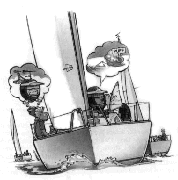| TRIM ON!!! ……PLEASE!?? |
| Last night I returned ashore after the long distance race (about 190 miles) of this year’s
North Sea Race that I sailed on Xiphias Racing Team (See:
www.xiphias.nl) an IMX 40 with an excellent crew.
Just before I went to bed I remembered one of my favorite books from Tom Linskey: “ Race Winning Strategies”. The reason for that was; a) the way that it’s written in a really funny and real lively way and b) that a lot of the thoughts I had after the race were about communication.
|
|
|

|
|
Illustration Tom Linskey
“Race winning strategies”
|
|
During this year’s very, very, very long version of the long distance, we had to deal with a lot of spinnaker sailing in light air. With sometimes less than 4 kts of apparent wind speed and 2 kts of current against in the black of night in thick fog there is no way one can just keep communicating about sailing. So of course there are the usual stories about wind, politics, the other gender, storm experiences and so on and so on and …
At the end of the night, in which we’ve desperately tried to keep the boat moving against the current and we had to deal with shifts of about 105 degrees, while was wind speed was dropping from 6 to 3 kts. We still hadn’t made much progress away from the boats that, off course had a much better rating then we, and I was at the end of my spinnaker trimming shift and my helms man was also dead beat tired.
“This looks like a good heading, keep it like that”. “Pressure building”. “Yeah, You can bear away to 225” I said while I fought not to lose my concentration and listen to the joke one of the guys was telling in the leeward rail. My grinder who’d help me sheet in when the kite needed it, was also on leeward of the ship and couldn’t help listening to the joke.
Suddenly a little cold spell of wind moved along my neck. I saw the shadow of the kite moving up. The pull on the sheet increased. I heard the water starting to ripple while to boat started to accelerate through the water. “Just keep this heading” I said to the helmsman. “Ok let’s take her up to 4 kts and then bear away 5 degrees” That happened and after 30 seconds the puff ended. My whole world faded away…….again…
The spinnaker luff started to fall in. I pulled in. “Velocity header!”
“Trim on”…… nothing happened.
“Trim on” I said again. Still nothing happened.
I tried to get the sheet in myself, but it was to heavy until it completely collapsed and then there was some action at the winch.
The joke was ended and so was the speed of the boat.
Disturbed the grinder looked up and asked why I didn’t trim the kite and I said “ Trim on …..Please??!!”
“To talk about talks…..”
Communication has two faces. If people communicate they do not only communicate the contents of the message but with that mostly also their relation with the person to whom they communicate. In “Pragmatics of Human Communications” by Paul Watzlawick introduces this phenomenon as meta-communication.
Here an example:
In sailing as in all other sports, people get exited, emotional etc. Communication therefore has an increased risk of getting too much emphasis on the extra meaning of the message sent, apart from the contents of the message.
Awareness of this meta-communication therefore cuts both ways. The sender needs to realize how he says things, but on the other hand the receiver needs to realize that what’s been said can have this extra message but is especially during racing of less importance.
Coaching teams for longer periods made me aware of these principles at work, and I learned how to use them help performing. I’ve also developed a lecture “Communication and Team” about it, but it needs more. It needs conflicts, acceptation and growing self-awareness. Things that don’t come easy and quick but can definitely help you win races if you’re sailing in a team.
Communication is not just one of the many aspects to sailing in a team. I think that a lot of races (and even complete talented teams!!) are lost due to bad communication, or too much, or maybe bad talking, or bad receiving…. Take time and think about it. Maybe your team needs to think about how and what is being said at what point, and by who, during, let’s say, a starting sequence.
This week we scored a 1st and a 3rd for the two long distance races and next week the series continues with the short courses in Scheveningen when there’s hopefully less time for jokes while racing. (Wind, God, please wind!!)
Good winds
PS: the joke was a good laugh!!
|